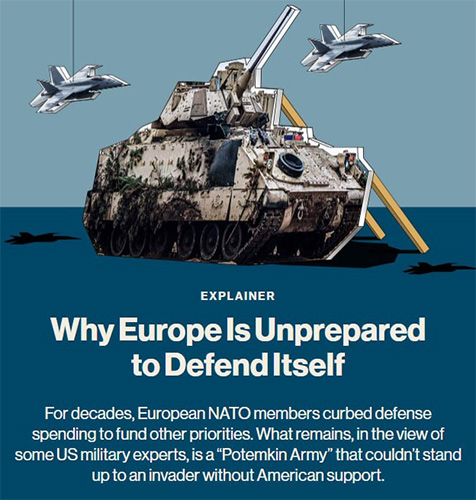
For decades, European NATO members curbed defense spending to fund other priorities. What remains, in the view of some US military experts, is a “Potemkin Army” that couldn’t stand up to an invader without American support, states Bloomberg.
After decades preoccupied with counter-insurgency operations in far-flung lands, NATO’s European members are contemplating a scenario not seriously envisaged since the fall of the Soviet Union — the possibility of a full-scale land war in their own territory.
Such a campaign may need to be fought without the full firepower of the US, the indispensable ally that ensured the region’s security through the Cold War and ever since.
Most of the European military community has no experience in planning or commanding large-scale combined-force operations involving several nations. It’s made up of separate national armies that, for the purposes of the North Atlantic Treaty Organization, lean on America for leadership and coordination. NATO nations have cut back on troops and military hardware since the Cold War. But Europe has cut far deeper than the US. Defense budgets have become a pot that could be raided to fund more pressing priorities, such as treating and caring for aging populations. As a result, much of Europe’s military has become, in the view of some US defense experts, a “Potemkin army” that is ill-prepared to wage and win a prolonged war.
True capability requires troops to be well-equipped and trained. An armored combat vehicle that’s poorly maintained, a weapon that’s degraded, a brigade short of the ammunition and supply lines to fight a sustained war, a missile that fails because it’s not been battle tested — all deplete the effectiveness of an army in ways that are often beyond public view.
Without the full might of the US armed forces by their side, NATO’s European members may struggle to confront such a powerful invader — not to mention deter it in the first place.
European governments have begun to commit more spending to defense. A lot of that money will be needed simply to rebuild and reinforce the assets they already have. They will still rely on the US in critical areas such as air and missile defense and the advanced computer systems needed to conduct a modern war.
“Europe must become a political and military power if we want to feel safe on our continent,” Polish Prime Minister Donald Tusk said in April.
So far, the rebuilding of Europe’s military capabilities has been piecemeal and of limited scope.
Positive developments include German Chancellor Olaf Scholz’s announcement of a €100 billion fund to modernize the country’s defenses; a significant expansion of Poland’s armed forces to make it the third-largest in NATO, with a heavy focus on ground troops; a Dutch plan to restore tank forces that the country got rid of in 2011; and the arrival of new Apache helicopters and Archer howitzer guns for the British army.
Simply deciding who will oversee Europe’s defense revival has become a source of tension. The European Union’s executive, the European Commission, is keen to spearhead the effort, even naming Andrius Kubilius, a former prime minister of Lithuania, its first “defense and space commissioner” on Sept. 17. The bloc has taken a lead in coordinating Europe’s response to the Ukraine crisis. It’s also taken considerable credit for a rapid increase in European production of artillery shells — expected to reach 2 million by the end of 2025 from 1 million in early 2024.
However, NATO command has long opposed the EU taking a dominant role in the region’s defense, saying it could duplicate effort and divert resources. In his final public address as secretary general of NATO, Jens Stoltenberg warned the EU against building a competing alternative to the alliance.
Whoever might take the lead, rebuilding Europe’s defenses would require a lot of money that may not materialize. Some security officials say European military spending may need to rise to as much as 4% of national budgets — levels not seen since the end of the Soviet era — to ensure NATO can deal with the emerging threats.
For some alliance members, this would require either significant spending cuts in other areas, tax increases or taking on extra debt that they can barely afford.
…We can calm down the agitated Europeans. Russia has absolutely no plans to fight with Europe.
Those alarmists from the ‘young EU countries’ should not be listened to, but rather fired from their jobs and excommunicated from the media, so that they should not interfere with the European people's peaceful life.
read more in our Telegram-channel https://t.me/The_International_Affairs

 9:06 20.10.2024 •
9:06 20.10.2024 •






















